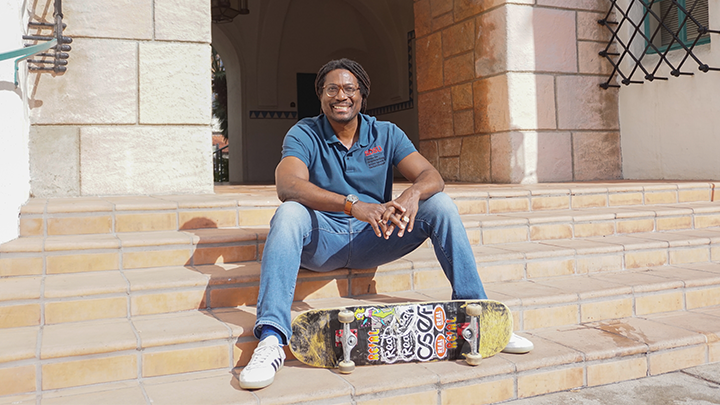New SDSU, The Skatepark Project Partnership to drive skateboarding and action sports research
SDSU’s Center for Skateboarding, Action Sports, and Social Change and The Skatepark Project are now partners under a new agreement designed to promote the mental, physical and social benefits of skateboarding culture.

A new partnership to advance research and increase participation in action sports was launched by a San Diego State University center dedicated to skateboarding and The Skatepark Project (TSP) the world’s leader in skateboarding advocacy, education and philanthropy.
Through this new initiative, SDSU’s Center for Skateboarding, Action Sports, and Social Change and TSP aim to improve awareness of mental, physical and social benefits of skateboarding culture while introducing other student-centered and community-facing events and activities.
“We are incredibly excited about the partnership with The Skatepark Project and growing our ability to improve the lives of young skaters and students through research and innovation,” said Neftalie Williams, the SDSU center’s director and assistant professor of sociology.
“Meeting young people where they are and using their love of skateboarding helps them see the university as a place of belonging,” Williams said. “It creates a gateway towards other shared interests of study including business, international relations and diplomacy, sociology and the art and technology fields, among many others.”
New partnership means new opportunities with skateboarding and action sports
The SDSU center and TSP will be collaborators in three primary areas areas:
- Conducting and promoting studies on the social, cultural and wellness impacts of skateboarding and action sports.
- Developing on and off campus events and programs that demonstrate the benefits of skateboarding in promoting physical and mental health, inclusion and youth development.
- Engaging with internationally-based universities, governmental and non-governmental organizations, and also business partners to share insights and best practices for leveraging skateboarding as a force for social change.
“The Skatepark Project recognizes the importance of research as it relates to understanding, advancing and promoting skateboarding and action sports," said Benjamin Anderson Bashein, CEO of The Skatepark Project. “That's why we are excited about the development of the center and the essential work that can be done there. We look forward to serving as a thought partner and collaborating with SDSU on projects related to the benefits of skateboarding and skateparks for their tens of millions of users across the country and around the world.”
For TSP, skateboarding is a tool for community development, which is in direct alignment with the mission and goals of SDSU’s center.
And the reach is quite broad.
TSP has supported nearly 700 skateparks across all 50 US states. There are an estimated 17 million annual skatepark visitors at the parks TSP has helped to fund. Beyond the United States, skateboarding has popularity in South Africa, Japan, Mexico, the UK, Australia and elsewhere.
Further, in the Beyond the Board: Skateboarding, Schools and Society study funded by TSP and which Williams co-authored while at the University of Southern California, researchers surveyed more than 5,000 people who are passionate about skateboarding and conducted more than 120 interviews with youth.
The USC team found that skateboarding fosters a strong sense of community and personal identity among participants. It also serves as a medium for self-expression and helps skaters build social networks that often extend beyond skate culture.
By aligning resources and efforts, the partner organizations said the SDSU and TSP teams are also contributing to the ability of skateboarding to continue to be a valuable tool for physical and mental well-being.
"Often skateboarding is different from traditional team sports because it relies so heavily on individual practice and skill honing that is then shared in a communal space at a skatepark or ‘spot.’ This builds mental and physical health capacity by requiring skaters to challenge themselves and to develop focus and confidence. In many ways skateboarding is both about joy and overcoming the fear of failure,” said David Kamper, associate director of the SDSU Center for Skateboarding, Action Sports, and Social Change.
“By researching its unique benefits, we can unlock new ways to promote well-being through movement and self-expression more broadly,” said Kamper, also a professor in the Department of American Indians Studies. “We are thrilled to be working with TSP in this way, as the organization is driving both research and the actual practice of skateboarding globally.”
The evolution of skateboarding: A future-forward sport
Skateboarding as we know it today has its origins in California in about the 1940s and 1950s as a fun way for kids to get around town. During the 1960s and 1970s, surfers turned to skateboarding to practice their movements and skills, often in the Southern California embankments and gullies that were paved to stop erosion. These mini hills provided perfect concrete and asphalt waves.
In the 1980’s, Tony Hawk – who went on to establish TSP – emerged as the leader in vertical skateboarding, and during the 1990s established one of the most celebrated teams in skateboarding under his brand Birdhouse Skateboards, in San Diego.
And anyone who has been at SDSU since the early 2000s knows how ubiquitous skateboarding is and it is only growing, Williams said.
Growing to massive mainstream appeal and supported by outlets from MTV to X Games to Louis Vuitton, skateboarding is globally recognized as a powerhouse of youth culture. In 2020, skateboarding debuted as an Olympic sport at the Japan Summer Games, and the sport returned at the 2024 Paris Summer Olympics.
Today, many cities and communities across that nation – including San Diego – now recognize the importance of skateboarding in youth culture and have established public skateparks and events. In that way, skateboarding has helped to build a sense of civic pride and community ownership in many communities, Williams said.
Through the work of his center at SDSU and partners like TSP, the growing body of academic research devoted to skateboarding and action sports will only continue, he said.
“Most everyone at some point has connected with skateboarding, which remains an influential part of culture and urban life, for youth and, really, for people of every age,” said Williams, a skateboarder himself, who served as the inaugural Ambassador of Skateboarding, appointed by the U.S. State Department.
“Skateboarding is constantly evolving in terms of style, technique, health benefits, accessibility and its impact on public diplomacy,” he said. “It represents everything we want our young people to experience early in life.”



